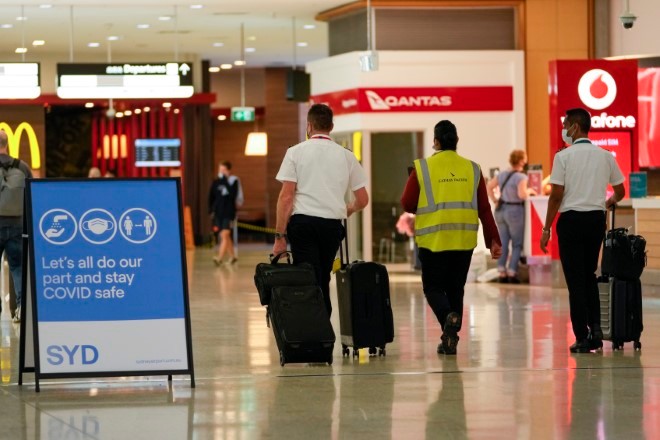
The Omicron mutation could benefit the tourism industry because many people are willing to move back thinking they won’t be reinfected.
Travel is now almost the same as it was before Covid-19. When traveling from Singapore to Switzerland via Bangkok (Thailand) last week, Raini Hamdi, a travel reporter for CNA, did not need to be tested for SARS-CoV-2 or download a tracing app. She only had to prove vaccination status.
The tourism industry has prospered after most of the country overcame the Delta variant. However, in late 2021, Omicron again dashed hopes of a recovery, leading to new travel restrictions ahead of the Christmas rush.
Since then, the number of Covid-19 cases has reached record highs in many countries, mainly occurring in the community. That may suggest that international travelers do not pose a greater risk than locals.
Aware of this, some governments are willing to live with Covid-19. Many travel restrictions are relaxed. Singapore announced the expansion of routes on March 4.
High vaccination rates may lead to this decision. Before Omicron, however, there was still some hesitation in moving.
While travel quarantine is difficult for many, what is more worrisome is the possibility of getting infected abroad.
What to do if the test is positive? How can I get medical care if I don’t speak the local language? Trouble arranging accommodation or bothering the company?
All those concerns disappear for people who recover after infection with the Omicron variant. Some may feel more confident about their immunity and find ways to satisfy the pent-up frenzy.
Slowly recovering
Tourism demand is skyrocketing. The International Air Transport Association (IATA) reported the fastest increase in international ticket sales in January and February since the outbreak of the pandemic. In early February, tourist ticket sales reached half of the pre-epidemic figure (February 2019).
This reflects the relaxation of travel rules announced around the world, including in Australia, France, the Philippines, the United Kingdom, Switzerland and Sweden.
After 2 years of staying in place, Singaporeans can’t wait to travel. Skyscanner saw a 71% increase in search volume in January compared to the previous month. The top destinations are Manila, Seoul, London, Kuala Lumpur and Melbourne.
According to travel analytics firm ForwardKeys, bookings from Singaporeans to Australia increased by 179% after the country reopened its borders.
“We are encouraged by the signs of recovery in the tourism industry,” said Brent Anderson, regional general manager for Singapore-based Tourism Australia.
Similarly, in the past month, Booking has seen an increase in bookings by Singaporean travelers to destinations as close as Kuala Lumpur and Seoul or as far away as London and Paris.
Tourism industry leaders believe tourism will rebound and recover in the long term.
However, the war in Ukraine caused oil prices to rise above $100 a barrel for the first time in seven years. Airfares can increase due to higher fuel costs, making travelers think twice.
Meanwhile, China, the world’s largest outbound travel market, allows people to travel only when they undergo a 14 or 21-day quarantine upon return. This regulation is quite strict as many countries have reduced or eliminated.
According to China’s National Bureau of Statistics and the United Nations’ World Tourism Organization, Chinese tourists made 169 million trips in 2019, spending $255 billion while abroad.
No hurry
The world is still far from connected before the pandemic. However, as more travelers pack their bags, are the destinations ready?
IATA’s analysis of the world’s top 50 air travel markets, including Singapore, found 37 open to vaccinated travelers with varying requirements. But only 18 of them removed quarantine orders or pre-departure checks.
Vaccinated travelers now face fewer complicated procedures than they did a few weeks ago. This gives them the confidence to buy tickets.
However, IATA Director-General Willie Walsh said that the lifting of travel restrictions could be accelerated further, such as removing isolation and testing requirements for people who are fully immunized or only require testing. A negative antigen test result is required prior to departure for those who have not been vaccinated.
The Covid-19 pandemic is unlike any other crisis the travel industry has endured.
Job losses and border closures have created a massive labor shortage. The service industry will suffer if they don’t address this issue before tourists return. Empty stores and shrinking nightlife signal gloom for the industry.
Omicron could convince governments to reopen borders and give tourists the confidence to move again. However, that is only half the picture.
The other half is the world, mostly vaccinated and recovering from Covid-19. The travel industry needs to worry less about getting things back to the way they were before the pandemic.
Australia welcomed its first international visitors in two years in Sydney on February 21 with the words “Welcome back to the world!” Paint near the runways. Airport and airline staff cheered while the kangaroo mascot hugged the tourists.
People understand that travel will return with excitement and wonder.
@ Zing News
